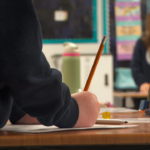
BURLINGTON, Vt. (WCAX) – Tomorrow is town meeting day, and one of the most contentious conversations happening for voters and leaders surrounds school budgets.
The anticipated tax hike is partially the result of the changes to how Vermont funds schools per pupil.
A 2022 change made it so pupils with more need got more funding with an added 5% tax cap to ease the financial strain on wealthier districts. However, the move didn’t go as planned, as communities who should have benefitted from the policy faced tax increases as well. That comes after the Common Level of Appraisal came out – increasing taxes for both wealthy and more rural communities.
In February, historic last-minute legislation eliminated that cap to avoid too many tax increases and allowed districts and Supervisory Unions to delay school budget votes. Now, legislators and school leaders are concerned that budgets might not pass.
For example, Champlain Valley School District is facing an 18% increase, Burlington School District a 14% increase, and Otter Valley Unified Union School District a 13% increase.
Recently, leaders in Montpelier offered schools to delay their budget votes in hopes that the extra time would help them trim down even more.
At least 11 budget votes are delayed, including First Branch Unified School District, Strafford School District, Windsor Southeast Supervisory Union, Stowe School District, Mount Mansfield, Echo Valley Community School District, the Blue Mountain Union School District, and the Hartford School District.
At least 95 school budget votes are going on their originally scheduled vote date as planned, whether it was originally scheduled for town meeting day or another day near.
Some Supervisory Unions, like Lamoille South, White River Valley, and Central Vermont have half their respective school district budgets voting on schedule and the other half delayed.
The governor said this last-minute legislation does not solve the problem, and that even if every school board makes budget adjustments, Vermonters are unlikely to avoid significant property tax increases.
This conversation comes as spending is increasing by 5% this year, and for the first time ever, the education fund surpassed $2 billion.
